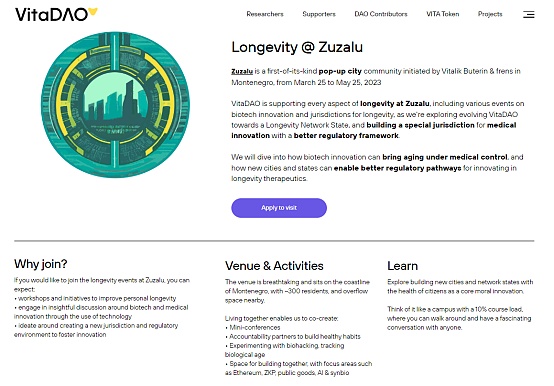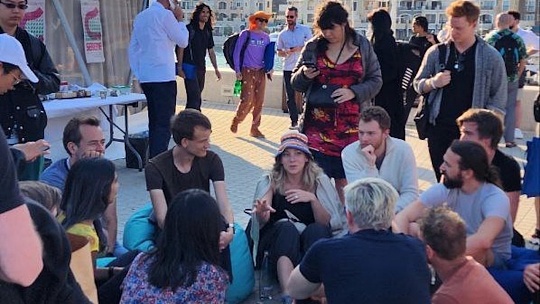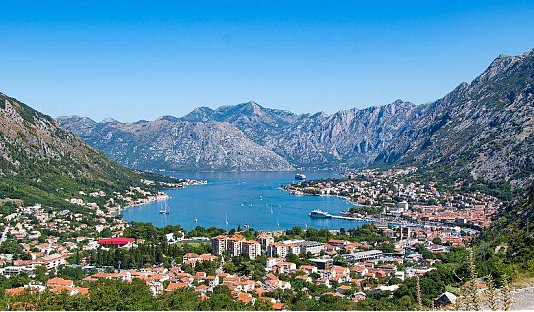Self-proclaimed equal Web3 wanderer stops at seeking immortals and asking the way.
A Web3 wanderer seeks immortals and directions.“Do you know? After earning money in Web3, some people begin to study immortality and metaphysics.” My friend said somewhat helplessly after a network debate on the topic of whether going abroad means freedom.
This also piqued my interest.
The pursuit of longevity through immortality and Taoism, much like the ancient emperors’ pursuit of immortality, is not uncommon among the elite circle. After obtaining wealth and status that only a few people can obtain, life becomes the only ungraspable quicksand. In the Chinese Internet circle, Ma Yun, Huang Zheng, and Zhang Yiming all retired and chose the life sciences track. In the Silicon Valley circle, this phenomenon is even more sensational. Various means such as leech therapy, fasting, and medication are used to promote longevity. Technology tycoon Bryan, who is dedicated to longevity, even uses his 17-year-old child’s blood plasma to regularly exchange blood.
However, it seems strange that this trend has also emerged in the emerging Web3 circle. Unlike discussing the paper wealth of Wall Street institutions, people’s impressions of Web3 seem to still be stuck in scams and conspiracies, immersed in various legends of small people getting rich.
- FTX shatters Taylor Swift’s crypto dream, $100 million collaboration also falls through.
- Vertex: A rising star in the derivatives DEX market, with a daily trading volume market share of around 10%.
- Multichain, the cross-chain bridge, is once again caught in controversy
So, is there a trend of longevity and immortality in Web3?
The emergence of digital nomads
The answer is yes.
And it all starts with digital nomads.
In 1997, Tsugio Makimoto, manager of Hitachi’s semiconductor and integrated circuit division, and David Manners, editor of the British Electronics Weekly, co-authored the book Nomad Workers, which first proposed the concept of “digital nomads.” In the book, they describe, “In the future human society, high-speed wireless networks and powerful mobile devices will break down the boundaries between professions and geographical areas. Thousands of people will sell their houses and embrace a new way of life that travels the world while relying on the Internet to generate income. These people earn a first-world income level through the Internet but choose to live in places with developing countries’ price levels.” In English, this group is more vividly described as Digital Nomad, with Nomad specifically referring to nomads who follow water and grass.

Representation of nomads in reality
One cannot help but admire the foresight of our predecessors. This description has become a reality. Today, digital nomads, who were born with coffee shops and WIFI, have become a special group on the Internet with a novel way of life. Although their numbers are still small, this group is growing rapidly. According to the 2021 Digital Nomad report released by MBO Blockingrtners, the number of workers in the United States who describe themselves as “digital nomads” is growing at an astonishing rate, with 7.3 million people in 2019, 10.9 million people in 2020, and 15.5 million people in 2021, with a year-on-year growth rate of over 40% for each year. In 2022, due to the impact of the epidemic, the trend of digital nomads has spread, and remote work has further increased their numbers. According to data, there are already 35 million digital nomads worldwide in 2022, and by 2035, this group will exceed 1 billion people.
Wandering people bring new business opportunities.
For nomads who choose to live on the road, the location is simple: a cost-effective and convenient broadband network, preferably accompanied by the most original fragrance of nature. This has also given many small countries that were once on the edge of the map hope for economic growth. Overseas, many areas such as Barbados, Malta, Iceland, Greece, Estonia, Bali, and Sri Lanka have become gathering places for digital nomads, while in China, Dali, Yunnan, and various ancient villages are the most popular. According to statistics, more than 20 countries around the world now offer digital nomad visas to attract visitors. Even nomads do not simply travel without preparation, and in this context, supporting services have also emerged and become mature, such as residence ratings, visa acquisition, and intermediaries. The mature industrial chain reflects the complexity of nomadic life.
From the perspective of nature, digital nomads are undoubtedly excellent advocates of value for Web3, which naturally has a distributed attribute. The decentralized characteristics of freedom, equality, and no sovereignty jurisdiction are fully reflected in the nomadic lifestyle, with the Chinese group being the most prominent. After China completely cleared out encryption, Web3 Chinese people were forced to wander around the world, even gaining the title of Web3 Jews. In the recent shocking case in Bali, Web3 Chinese people once again found themselves in the eye of the storm.
The Controversial Longevity DAO
Even nomads need a sense of belonging.
Unlike the impression of escaping the world known to the public, as a human being with prominent sociality, digital nomads still need community and connections between people. DAOs with interest group modes begin to play a key role in it. It is not surprising to say that any imaginable event attribute has a DAO. The path of cultivating immortals is long, but extending life is very practical. For the convenience of operation, the author searched DAOs with “Longevity” as the keyword and found a community that is really engaged in related research-VitaDAO.
According to the official website description, VitaDAO was established in 2021, initiated by Tyler Golato, a decentralized biotechnology protocol Molecule, with the aim of funding longevity research. Currently, there are more than 9,000 community members, all of whom are “enthusiasts, researchers, and contributors” in this field. In 2022, VitaDAO invested more than $3.5 million in projects researching aging-related diseases, cell biology, and restoration of age-related physical injuries.
VitaDAO, with a sense of future and cult, has a strong lineup of participants. In the new round of financing of $4.1 million completed at the beginning of the year, investors include pharmaceutical giant Pfizer Ventures, venture capital fund Shine Capital, L1 Digital investment group, and Ethereum founder V God.
So far, Zuzalu, which is most closely related to the theme of this article, has finally emerged.
Zuzalu is the first flash-style city community launched this year by V God, Frens, and Vita DAO in Montenegro, lasting two months from March 25th to May 25th. In this experiment, Zuzalu, as a small town that combines cryptocurrency, life science, and philosophy, attracted 200 residents from all over the world to participate, and about 700 people came to visit. In Zuzalu, residents can register and receive an electronic “passport” generated by zero-knowledge proof through ZuBlockings, temporarily stopping from being digital nomads and becoming Zuzalu people with real residency, discussing issues such as longevity, public governance, zero-knowledge proof, artificial intelligence, and building a more real encrypted city.

Description of Zuzalu on VitaDAO official website, source: VitaDAO official website
Due to financial constraints, the author was unable to participate in the experiment in person, but remotely glimpsed a part of the urban experiment in the community. In the description of supporters, Zuzalu has become a symbol of spiritual freedom and has the ability to change the career and life choices of many Web3 people.
In the morning, go to the beach to meditate, go to the mountain to pick wildflowers, listen to the bells of the Black Mountain Church, practice Vajra Gong by the sea under the moonlight, here, completely get rid of personal trivial life, away from worldly pressures such as mortgages and car loans, just immerse in the utopia gifted by nature, accompanied by mountains and water, it’s so joyful. In the thousands of words of feedback from visitors, Zuzalu has already risen to the discussion of nomadic civilization and network order, a height that ordinary people cannot reach.

V God discusses with everyone about Zuzalu, source: Coindesk
Peaceful and serene, but cut off from the world, throughout the event, there is a twisted feeling of yearning and strangeness, which is even more pronounced in the Web3 world.
The Web3 world is made up of the most complex group of people, Wall Street elites and native OGs, bottom feeders and speculators are entangled here, and the contempt chain is layered on top of the full-of-anger gambling den. Here, life views and values are difficult to avoid intense confrontation.
Some people are quite disdainful of Zuzalu, thinking that it is just a game for the elite. “Yes, before you participate, you need to have money to buy your round-trip plane ticket to Montenegro and arrange accommodation. Then you need to have free time to participate in the discussion without being fully committed to work. In summary, this has already screened participants, so what is there to talk about equality and freedom of thought?” said Cynic, who holds multiple professions.
There are also some curious people who ask, “So can Zuzalu solve practical problems such as high housing prices and children’s education in real life?”

For supporters of the project, Zuzalu is a simulation experiment of online culture overflow, which is a strong philosophical significance rather than simply carrying the word “rich”. “It is not a network of rich people, but may become a network of intellectual elites, or a network of “scholars”.” Tang Han, the initiator of SeeDAO, wrote in his feedback.
Some people think that this is a reasonable interpretation of Web3. “Escape is shameful but useful. Although it does not involve solving real-life problems, it is more like a utopian experience of a parallel space that can evade existing social structures through diversified roles.”
Web3’s worldview
The discussion is far from just Zuzalu itself.
In the discussion in which my friend participated at the beginning, the issue of whether going abroad means freedom has caused irreconcilable conflicts. The netizens on the affirmative side believe that going abroad means freedom of speech and welfare protection, and it is not necessary to become rich in the traditional sense to enjoy freedom, so they suggest that young people without burden should develop more overseas. The opposition emphasized that without economic foundation, there is no talk of freedom, and this situation is not divided between the mainland and overseas. This debate gradually moved from whether to go abroad to whether Chinese people are discriminated against overseas, causing feedback from the group, and finally stopped at a silent silence after discussing their growth environment.
Behind this battle of words, I feel more deeply that even in Web3, which claims to be equal for everyone, and even adds the free-spirited Buff of digital nomads, the world has never been flat. The desire for freedom is inevitably confined by the bottleneck of reality, and the social class limits the ceiling of participation. Just like the seemingly threshold-free longevity DAO, it also contains countless chips that are difficult to speak out.

The beauty of Montenegro does not belong to everyone, source: Google picture
However, in the debate, the affirmative side, who has always lived in a relatively affluent family, even in overseas, enjoys friendly neighbors and a harmonious community atmosphere, and the argument he supported is the direct feeling given by the living environment, but for ordinary people, obviously The opposition’s argument is more grounded and easier to accept, after all, even going abroad implies a certain price, let alone survival overseas.
In the final analysis, the gap is reflected in all circles and will not change because of Web3. On the contrary, the emergence of Web3 is precisely due to the slowdown of liquidity and the solidification of classes. This industry carrying the dream factor of small people has emerged due to the desire of ordinary people to leap, accelerated by the influx of elite groups, and retreated due to the increase of diversity. So far, its differences from other industries are gradually being filled, and the opportunity for sudden wealth is rapidly declining with the entry of institutions, and the contempt chain is gradually spreading. Fortunately, Web3 still gives individuals more opportunities to choose. In the present situation where opportunities are not many, choice is a hope that is not easy to come by.
Returning to the discussion itself, this model has encountered practical problems. The digital nomadic lifestyle does not mean low cost, low expenses, and eternal harmony. The basic expenses of clothing, food, shelter and transportation are not enough to talk about, and the seemingly benefited natives are already dissatisfied. Recently, there has been a discussion about the new colonialism of digital nomads. Digital nomads who earn high incomes in the First World and then go to live in the Third World inevitably erode the lives of the indigenous people. The ecology is being transformed, and forced relocation of indigenous people is not uncommon. Take Mexico City as an example. The influx of people has pushed up the price of infrastructure. In three years, the rent in the digital nomad settlement area has increased by 60%, making it difficult for the original residents to afford to leave their homes.
The situation is even more intense in Bali, where the indigenous people believe that foreign tourists enjoy the privileges of foreigners and demand that the government take action. “Even with an expired tourist passport, they will not be expelled, and they can even live without paying taxes and enjoy life, while the locals struggle to fill their stomachs with $177 a month,” one netizen wrote on Twitter.
Conclusion
Currently, it seems that the journey of repairing and immortalizing in Web3 has already begun, and the most influential people have already joined it. The groundless accusations of others are useless, and more ordinary people are just complaining in their busy lives. Moreover, compared with the billionaires fighting on the front line of longevity, the Web3er’s quest for immortality is still on the edge of breathing fresh air and doing aerobic theory, far from the step of blood transfusion, cloning, and gene modification.
Interestingly, despite all the efforts, life expectancy has not increased significantly. The latest report data released by the US National Center for Health Statistics shows that the average life expectancy of Americans has dropped from 77 years in 2020 to 76.4 years in 2021, falling back to the level of 1996. Of course, it must be admitted that the efforts of the bigwigs are not without effect. Compared with poor people of the same age, the rich have increased their life expectancy by about ten years.
Whether Silicon Valley bigwigs or upper-class Web3 people, they can live up to ten years longer than hard-working workers at most, which may be good news in misfortune, after all, death is equal to everyone.
We will continue to update Blocking; if you have any questions or suggestions, please contact us!
Was this article helpful?
93 out of 132 found this helpful
Related articles
- Some thoughts on heavy collateralization: What are the opportunities and challenges?
- Analysis of the Massive Abnormal Outflow of Multichain Tokens: Not Simply a Hack, Nor Loss of Complete Control due to Uncontrollable Factors
- A glimpse of the emerging new use cases for ZK: zkML, ZK Games, ZK ID
- Decoding the DEX newcomer Vertex: average daily trading volume of about 40 million US dollars in the past 7 days, with a daily trading volume market share of about 10%.
- Can ERC’s Finalize establish its orthodox status?
- Inverse Finance: A Rebirth from the Brink of Death?
- “The Three Pain Points” of Digital Asset Trading






